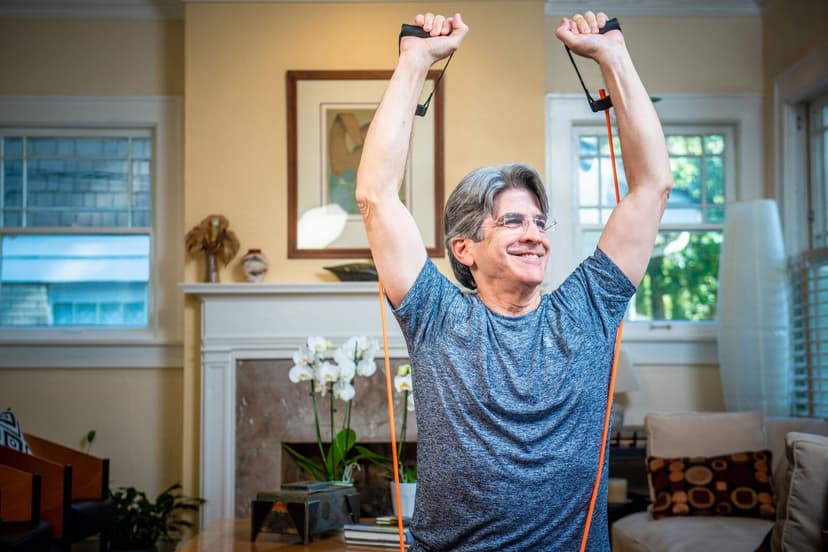As we get older, it's normal to lose some muscle. This can make us weaker and less steady on our feet. But don't worry, there are ways to slow down this process. By eating right, exercising, and making some lifestyle changes, you can keep your muscles strong and healthy.
Key Takeaways
- Sarcopenia is the natural loss of muscle as we age, but it can be slowed down.
- Eating a balanced diet with enough protein is crucial for muscle health.
- Regular exercise, including resistance training, helps maintain muscle mass.
- Hormones like testosterone and growth hormone play a role in muscle health.
- Staying active and managing stress are important for keeping muscles strong.
Understanding Age-Related Muscle Loss
What is Sarcopenia?
Sarcopenia is the gradual loss of muscle mass and strength that occurs as we age. This condition can lead to frailty and a higher risk of falls and injuries. It's a natural process that affects everyone over time.
The Impact of Aging on Muscle Mass
Muscle mass typically starts to decline in our 30s, with a more noticeable decrease after age 60. Studies show that muscle mass decreases by about 3 to 8 percent per decade after age 30. This loss of strength can make daily activities more challenging and impact overall health.
Early Signs of Muscle Decline
Early signs of muscle decline include feeling weaker, having less stamina, and finding it harder to perform physical tasks. An inactive lifestyle can speed up this process, so it's important to stay active to maintain muscle strength.
The Role of Nutrition in Preserving Muscle Mass
Essential Nutrients for Muscle Health
To keep your muscles strong as you age, it's important to get the right nutrients. Vitamins and minerals play a big role in muscle health. For example, vitamin D helps your body absorb calcium, which is needed for muscle function. Other important nutrients include magnesium, potassium, and omega-3 fatty acids.
The Importance of Protein
Protein is crucial for building and maintaining muscle. As you get older, your muscles may not respond to protein as well as they used to. This means you might need to eat more protein to get the same benefits. Good sources of protein include lean meats, fish, eggs, and beans.
Hydration and Muscle Function
Staying hydrated is also key to muscle health. Water helps transport nutrients to your muscles and removes waste products. Dehydration can lead to muscle cramps and weakness. Aim to drink plenty of water throughout the day to keep your muscles working well.
No matter how old you are, you can combat muscle loss with the right nutrition and exercise. Eating the right foods and staying active are both essential for keeping your muscles strong.
Effective Exercise Strategies for Older Adults
Resistance Training Benefits
Resistance training is crucial for older adults. It helps increase muscle mass and strength, which are vital for daily activities. Simple exercises like power chair stands, leg lifts, and triceps extensions can make a big difference. High-velocity resistance training, which involves lifting weights quickly, can also be beneficial.
Incorporating Aerobic Exercise
Aerobic exercises, such as walking, swimming, and cycling, are essential for cardiovascular health. They help improve endurance and overall fitness. Aim for at least 150 minutes of moderate-intensity aerobic activity each week.
Flexibility and Balance Exercises
Flexibility and balance exercises are important to prevent falls and maintain mobility. Activities like yoga and tai chi can improve balance and flexibility. These exercises help older adults stay active and independent.
Staying active through a mix of resistance, aerobic, and flexibility exercises can greatly enhance the quality of life for older adults.
The Influence of Hormones on Muscle Health
Testosterone and Muscle Mass
As we age, our hormone levels change, and this can affect our muscles. Testosterone, a key hormone for muscle growth, decreases over time. This drop can slow down the production of muscle proteins, making it harder to maintain muscle mass.
The Role of Growth Hormone
Growth hormone also plays a part in keeping our muscles strong. It helps with muscle repair and growth. As we get older, the levels of growth hormone in our bodies go down, which can lead to weaker muscles.
Managing Hormonal Changes
To help manage these changes, it's important to stay active and eat a healthy diet. Regular exercise can boost hormone levels and help keep muscles strong. In some cases, doctors might suggest treatments to help balance hormone levels.
Staying active and eating well can help manage the hormonal changes that affect muscle health as we age.
Lifestyle Changes to Support Muscle Maintenance
Avoiding a Sedentary Lifestyle
Staying active is crucial for maintaining muscle mass as you age. Even short breaks in muscle use can lead to a reduction in muscle size and strength. Simple activities like gardening, walking, or cycling can make a big difference.
The Benefits of Regular Physical Activity
Regular exercise helps combat age-related muscle loss. It doesn't matter if you prefer the gym, gardening, or biking; the key is to keep moving. Aim for a mix of resistance training, aerobic exercises, and flexibility workouts to maintain muscle health.
Stress Management and Muscle Health
Managing stress is also important for muscle health. High stress levels can lead to muscle tension and fatigue. Techniques like deep breathing, meditation, and yoga can help reduce stress and support muscle maintenance.
Maintaining muscle mass as you age is not just about exercise; it's about a balanced lifestyle that includes proper nutrition, regular activity, and stress management.
Monitoring and Assessing Muscle Health
Regular Health Check-Ups
Regular health check-ups are essential for keeping track of your muscle health. Routine visits to your healthcare provider can help catch early signs of muscle loss. These check-ups often include physical exams and may involve blood tests to check for deficiencies that could affect muscle mass.
Tracking Muscle Strength and Mass
Monitoring your muscle strength and mass can be done through various methods. You can use simple tools like a handgrip dynamometer to measure grip strength or more advanced techniques like DEXA scans to assess muscle mass. Keeping a log of your progress can help you stay motivated and identify any concerning trends.
When to Seek Professional Help
If you notice significant muscle weakness, frequent falls, or difficulty performing daily activities, it may be time to seek professional help. A healthcare provider can offer a comprehensive evaluation and recommend appropriate interventions, such as physical therapy or nutritional guidance.
Staying proactive about your muscle health can make a significant difference in your overall well-being as you age.
Conclusion
Aging and muscle loss are natural, but you can fight back. By staying active, eating right, and keeping up with resistance training, you can keep your muscles strong. It's never too late to start. Even small changes can make a big difference. Remember, the key is consistency. Keep moving, stay healthy, and your muscles will thank you.
Frequently Asked Questions
What is sarcopenia?
Sarcopenia is the loss of muscle mass and strength that happens as people get older. It's a natural part of aging and can make you weaker and more likely to fall.
How can I prevent muscle loss as I age?
You can help prevent muscle loss by staying active, eating a balanced diet with plenty of protein, and doing exercises like resistance training. Even simple activities like gardening or walking can help.
Why is protein important for muscle health?
Protein helps build and repair muscles. As you age, your body needs more protein to keep your muscles strong. Eating foods like meat, fish, eggs, and beans can help.
What types of exercises are best for older adults?
Older adults should focus on resistance training, aerobic exercises, and activities that improve flexibility and balance. These can help maintain muscle mass and overall health.
How do hormones affect muscle health?
Hormones like testosterone and growth hormone play a big role in muscle health. As you age, levels of these hormones drop, which can lead to muscle loss. Managing these changes can help keep muscles strong.
When should I seek professional help for muscle loss?
If you notice a significant loss of strength or muscle mass, or if you have trouble doing everyday activities, it's a good idea to talk to a doctor. They can help you find the right plan to maintain your muscle health.
























